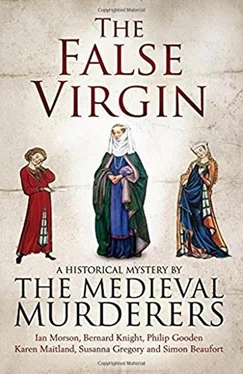He wondered if St Beornwyn had been, in truth, as pure and pious as she was painted. An unholy thought occurred to him, like a little imp darting through his head. Suppose Beornwyn were no different from most other girls and women. Suppose she had rejected her father’s choice of husband not out of any desire to lead a virginal life but because she already had a lover. A lover, whose identity or even existence had to be concealed for some reason – say, because he was low-born or came from a rival family. All speculation, of course, and probably a slander on the dead lady. But no more unlikely than the story in the manuscript that the Bermondsey prior was urging on him. In fact, if Richard hadn’t stressed Beornwyn’s virginity so much, then Geoffrey thought he might not be responding like this, with scepticism and a mischievous wish to undermine the legend. Chaucer did not disbelieve in the legends of saints. But he didn’t quite believe in them either.
Almost before he knew it, he was lighting the candles that stood on the little table, sitting on the stool, picking up one of the quill pens, dipping it in the ink-pot and scrawling a few lines on a sheet of paper. The outline of the piece was clear in his head. He would cast it in the form of a dream. The first few lines turned into a page and then several pages. The thing flowed, via his hand, from his head onto the white sheets on the desk. He must have been writing for some time for he was dimly aware of the ringing of the matins bell, a time when it was closer to dawn than to dusk. The candles burned down, and still he scrawled away. Eventually, as light was creeping back into the sky and the birds were beginning to sing, Geoffrey rubbed his eyes. Now he was tired, but he was also satisfied. He left the scrawled sheets, returned to bed and settled down to sleep.
He woke at around the hour of terce, well into the day, so far as the monks were concerned. It was a sharp morning, the wind rattling at the shutters in the window of the guest-chamber. Geoffrey returned to the desk, sat down and read through what he had written in one continuous rush during last night. Strangely, it seemed to have been written by a different person from the one who was scanning it now. The piece began quietly enough, with the writer’s inability to get to sleep after hearing the tale of the terrible martyrdom of a pure and virtuous woman. Then, when at last he begins to slumber, he starts to dream. In his dream the martyred woman is a very different being, a devotee not of Christ but of her passion for a man. She dies at the hands of the man’s rival although the rumour is put about that she perished for her faith. When the dreamer awakes he is unable to decide which version to believe.
Alas, I know not how to deem,
To trust the story or the dream?
Geoffrey yawned. The piece needed plenty of work but the basic idea was there. It would surely go down well with a worldly audience such as the one at the Palace of Savoy. He wondered what his wife, Philippa, would make of it.
Meanwhile Chaucer’s wife, Philippa, was not thinking at all of her husband, tucked away in Bermondsey Priory. If she had been thinking of him, then it would most likely have been in a baffled sort of way. For she could not understand his attraction to Bermondsey. It was a hushed, bookish spot, full of men, away from the colour and flurry of court life at the Savoy.
Like her husband, Philippa Chaucer owed her present position to John of Gaunt, and to the court service she had done for John’s mother, the late Queen, also called Philippa. Now she was nominally in service of another queen, John’s new wife from Spain. But like her husband, she found herself with time on her hands. Her duties at court were so light that they scarcely existed. She made a point of seeing her children often, but their immediate care and instruction was in the hands of others.
Philippa had just been talking with Elizabeth, her ten-year-old. Every morning she ran through what the girl had learned the previous day and gave her encouragement for the one to come. Because she was not from England, Philippa was concerned that her daughter in particular should be familiar with at least the French and Dutch languages. Her son, Thomas, showed less inclination for learning and, anyway, she felt boys were better able to fend for themselves.
After Elizabeth left, Philippa remained sitting by the fire. The morning was cold, with gusts of wind rattling the windows. There was a knock at the door. She recognised this knock and called out for the visitor to enter. Carlos de Flores came in, bowing his head a little. She indicated he should sit opposite her, in the place recently vacated by Elizabeth. He smiled and sat down, all the time regarding her with his steady brown eyes.
When John of Gaunt brought his new bride home to the Savoy Palace, the Castilian princess did not come alone. Constance arrived with a retinue of counsellors, priests and servants. And there were others whose precise functions were not so well defined but who had to be found well-appointed lodgings somewhere in the rambling spaces of the palace. Carlos de Flores was one such individual. His English was near-perfect and he had the manners of a courtier.
‘I trust I find you well, madam.’
Before Philippa could reply another gust shook the panes and cold air swirled round her feet.
‘Well enough… considering this weather.’
‘Ah, yes,’ said the Castilian. ‘The weather. Before I came to your country I was told that, of all things, the English like to talk about their weather.’
‘That must be because there’s so much of it to talk about.’
Smiling to show that he had understood Philippa’s joke, Carlos de Flores said, ‘You show yourself a true Englishwoman by saying so, madam, yet you are from Hainault originally, are you not? You and your sister?’
Philippa wondered why de Flores was bothering to mention this. It was no secret that she and Katherine were the daughters of a knight who came from a small country snuggled into a corner of Europe. Either the Castilian was just passing the time or he was showing that he had dug a little way into their histories.
‘We come from Hainault, yes,’ she said. ‘This England was hardly more than a place across the seas where our father went to serve the Queen. Yet the weather in Hainault was very similar to here, Señor de Flores. In fact, I’d say it was worse.’
In her mind’s eye Philippa saw the great flat spaces of her childhood scoured by wind and rain. She remembered the high summers, when the ditches dried up and she and Katherine, having nothing else to do, would watch the men at work in the fields. All this time she was conscious of the Castilian’s gaze. He was stroking his hands on the arms of his chair as if they were made of fur rather than wood. His long fingers were adorned with rings.
‘You are thinking of your country?’ he said.
‘That was many years ago, in my childhood.’
‘Surely not so many, madam, to see you now.’
Despite herself she coloured slightly and said, ‘I am past my youth.’
Seeing his success, de Flores persisted. ‘We have a saying in my country. Only the owner closes the door on his youth – and its pleasures.’
I’m almost thirty, she wanted to say. I have two children and my husband has absented himself again. I know I am no beauty. If you want to compliment someone then go and talk to my sister. Her husband is dead and she is linked to one of the very highest in the land. I think you’ll find she is more apt for this kind of talk than I am.
But she said none of this.
Then she saw his brown eyes looking at her in the eager way of a dog when it wants something, a kind word, a scrap of food. Perhaps he was in earnest after all. He was about the same age as she was. Darker complexioned, of course. You couldn’t deny he was handsome, although his nose was too small for her liking. She smiled slightly at his gallantry.
Читать дальше












